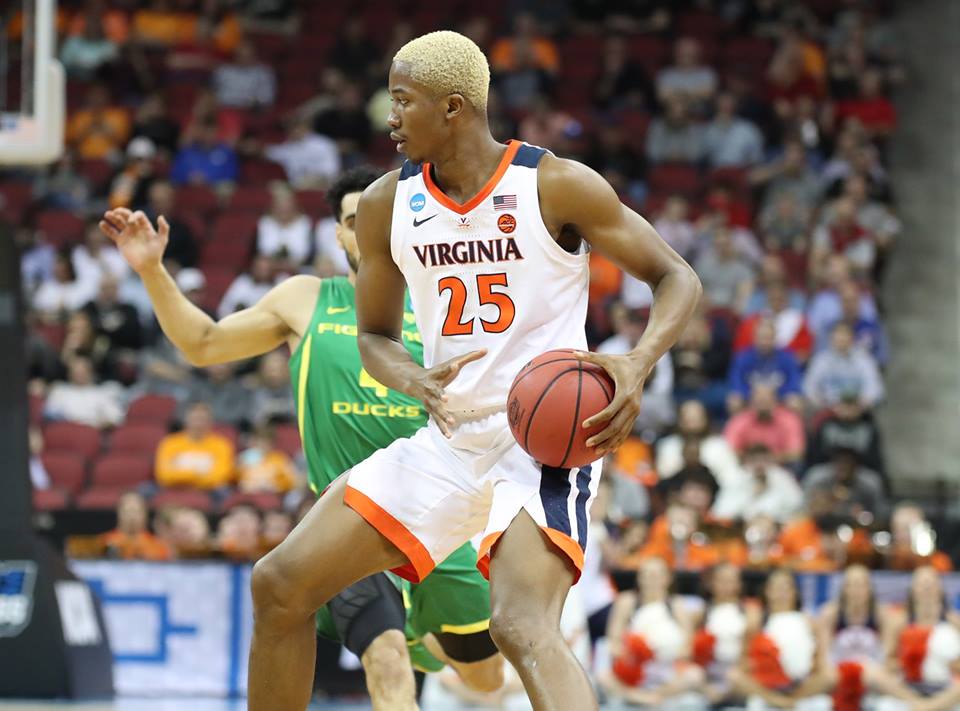
When the Virginia basketball team won the National Championship three months ago, I was fortunate enough to be along for the ride. From Columbia to Louisville to Minneapolis, I watched live as the Cavaliers pulled off their historic run to the program’s first title.
With summer here and no college sports in play right now, however, I’ve circled back to rewatch the run again and I’ll share some thoughts as I go. Next up, the Sweet 16 game with Oregon.
The Diakite Game
In some ways, the Oregon game gets lost the same way as the Oklahoma game did. It was sandwiched between the 1-16 repeat drama and the three-game roller coaster of emotions that led to UVA’s first title. It lacked the vintage Virginia vampire vibe (the defense sucks the life out of opponents) the Sooners’ win did with a lot more drama down the stretch.
The offense on both ends struggled to find any rhythm – the Cavaliers shot 35.7%, the Ducks 37.8% – and the final score followed suit at 53-49. Some of that was the puzzle created by two strong defenses at that point in the season, but both teams missed quite a few open looks both early and late too. At one point in the first half, the Hoos had missed 15 of 16 shots. The game started with a 7-7 tie in the first 10 minutes and ended with a 13-10 slugfest in the final 10 minutes, meaning the two teams combined for nearly double the points in the middle portion of the game than the bookends.
Neither team turned to the bench too much as a result with nine players logging 30 minutes or more and just one player, Oregon’s Will Richardson, passing 20 minutes off the bench. Among those nine players, the box score shows Mamadi Diakite with 7 points, 11 rebounds, 2 blocked shots, and 2 steals in 35 minutes. He was the only Virginia starter in single digits and this was the only time before the Final Four that he scored fewer than 14 points. The previous outing against Oklahoma is when the national TV guys had so much fun trying to say his name and Bill Raftery added the joyful “Mama-do!” line to a dunk.
Yet, when I rewatched this game, even in the early going, it jumped out to me as “The Diakite Game.” Why?
It wasn’t the Jedi mind trick that toppled Ehab Amin and eventually led to a double technical, though that does give this game a signature moment. It was two things: defense and consistency.
Like UVA’s identity, defense gets the first look here. Diakite, by my estimation, was exceptional. Truly outstanding. He walked the tightrope that is help-and-recovery defense within Virginia’s system with nary a bobble. He combined hedge defense on ball screens at the level of Akil Mitchell’s standard-setting ways with the sort of sixth sense paint eraser qualities of Isaiah Wilkins. As a result, Payton Pritchard rarely got up a head of steam to collapse the defense and Oregon seldom got a chance at one of its easy basket favorites – the oop high over the help to 6’9” risers like Kenny Wooten. Diakite gave up just one of those dunks. Plus, he cleaned up the defensive glass.
The stats show some of that impact with 8 defensive rebounds and the 2 blocks-2 steals line. I don’t think that really captures it, though.
Sports-reference.com’s advanced box sheds better light on it. Diakite posted a defensive rating of 73 in the win, which topped every other player in the game by 11 points (Jack Salt at 84 and Ty Jerome at 85 were next best for UVA, while Amin’s 87 and Paul White’s 88 led the Ducks). That same advanced box shows an 11.4% block rate (estimate of the percentage of two-point attempts that were blocked) and a 32.7% defensive rebounding percentage, both of which easily distanced anyone on Oregon’s side.
There have been better statistical defensive outings, but in that setting in a defensive battle, Diakite really came through. The highlight plays included a blocked shot after he had to recover back across the lane from a post trap and a weak-side help block that he pinned on the glass when White used a spin move on a high post drive to create a layup attempt.
The proof is in the pudding piece of his performance came with the game on the line, though. He twice poked the ball away, including a steal in the lane with the defense spread out and a drive coming his way at the 3:55 mark with the score tied at 45. The next possession featured Ty Jerome’s go-ahead 3-pointer. He added a defensive rebound at 3:05, a well-timed contested shot on Louis King, who had been hot from 3-point range, at 2:30, and another defensive rebound at 1:52. In other words, on four straight possessions with the game in the balance, Diakite made a play on defense.
Beyond the defense was the consistency, both within the game and within the tournament run, that allowed Diakite to stay on the floor. So many times, Virginia fans have wanted and waited for Diakite to string it all together for a sequence of games. The Oregon game was so important in that regard. Diakite had produced good games before and had become a consistently bothersome defender earlier in the year, but he had rarely – if ever – reeled off six straight games with scoring and rebounding like the tournament run.
And, remember, while he played well in the Columbia regional, just a week earlier he had been a non-factor at the ACC Tournament with 5 points and 0 rebounds in two games combined. So when Sweet 16 day arrived against Oregon, it became a huge turning point game for Diakite in terms of consistency because it showed that he could be a strong contributor on back-to-back high-level weekends. It marked the third straight game with at least 7 points and the third straight game that he set or tied a new career-high with rebounds.
Overall during the tourney, Diakite recorded at least 7 points and at least 7 rebounds in the same game in five out of six games, meaning he topped his regular season averages in both categories on a nightly basis. The one blip came against Auburn with 2 points and 6 rebounds. Prior to the tournament, he had managed that same 7-7 benchmark just four times (Boston College on Jan. 18, Wake Forest on Jan. 22, Notre Dame on Jan. 26, and Georgia Tech on Feb. 27 earlier in the season) in his career and had, in fact, grabbed 7 more more rebounds just five other times in his career (those four games plus Yale in 2017-18).
Diakite scored 9 points in four out of six games in the tournament. He had produced scoring surges like that more often than rebounds before, reaching that 9-point barrier 24 times in his career before the NCAA Tournament. The consistency piece again is the key, though. He had scored like that over a course of games just once before, going for 9+ five times in six games to end his sophomore season (Georgia Tech to Clemson in ACC Tournament). A three out of five games stretch (South Carolina through Boston College) and three out four games stretch (Wake Forest through Miami) were the only two other instances that were close.
Further, Diakite avoided foul trouble as another sign of consistent play. He had 3 fouls or more twice in the six games for the title (33% of the games). Prior to the tournament, he had 3 fouls or more 15 times in 32 games (47%) and 41 times in 98 career games (42%).
Watching the Oregon replay drove home the point of just how important Diakite was for the National Championship finish. It was hard to take an eye off of him for long stretches in the game and he regularly was flying around on defense against the Ducks. So, yes, the Sweet 16 game could easily be remembered for Kihei Clark’s big shots (and his big grin with the sealing free throw at the end), Ty Jerome’s yet-again clutch play (I called his play masterful at the Final Four), or the defensive battle. It could get lost in the shuffle after the dramatic final three games. But, watching the replay for the first time for me stood out as The Diakite Game.



